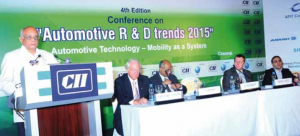– R. Chidamabram
 Chennai has the right environment to become the automotive research and development (R&D) hub with the presence of a number of automotive research centers of the industry and academic institutions in and around the city, according to Dr. R. Chidambaram, Principal Scientific Advisor to the Government.
Chennai has the right environment to become the automotive research and development (R&D) hub with the presence of a number of automotive research centers of the industry and academic institutions in and around the city, according to Dr. R. Chidambaram, Principal Scientific Advisor to the Government.
Addressing the fourth edition of the conference on “Automotive R&D Trends 2015”, organised by the Confederation of Indian Industry (CII), he said Chennai has automotive industry-led research institutions like Ashok Leyland & Nissan Research Joint Venture; Mahindra Research Valley, research teams of Hyundai, Renault, etc., and academia like IIT Madras, IIT Research Park, Anna University, Madras Institute of Technology, many private universities and colleges to carry out R&D on proprietary or generic automotive technologies.
The automotive industry is compelled to have “intelligent mobility systems, the key to which lies in connecting up a range of independent industries and technologies.”
R&D has to be in areas like materials, to create light-weight alloys and joining of different types of materials, energy efficiency, emission control, driver assistance, safety, embedded systems and creation of a disposal chain. “These developments are possible only if the Indian automotive sector optimally utilizes the R&D capabilities of the academic institutions and national laboratories. The e-infrastructure in India is also growing very rapidly, and must be effectively utilized by the automotive sector”.
Dr. Chidambaram further said that though the proprietary research by companies could be done by technology transfer or in-house R&D and supportive applied research, it would be better for the industries to make use of the technology assessment capabilities of the academia. The directed basic research supported by the Government could be based on technology foresight analysis. This can be done on the long-term requirement of a company not only in the automotive sector but other areas also.
According to Dr. Chidambaram, for every industry there should be directed basic research as some areas would always be India-specific. “India is interested in R&D that leads to innovation”.
For the creation of a disposal chain, the Ministry of Heavy Industry and the automobile industry have set up a demo centre for automobile recycling at GARC, Oragadam. Industry has donated large numbers of cars and two-wheelers to kick-start the center.
Effective recycling could generate two million tons of steel, 1,50,000 tons of aluminum and 75,000 tons of rubber and plastics by 2020, and the figure would increase by 10 per cent a year thereafter, he added.
Dr. V. Sumantran, Conference Chairman and Executive Vice Chairman, Hinduja Automotive Ltd., said there are many trends that “lead us to believe that we can no longer address automotive technologies in the context of passenger cars alone”. Some of the trends are the need to find cost-effective, more economic and sustainable systems, greater concern for environment, urbanization and population density which “compel us to think differently about mobility”, and reversal of trends seen so far like reversing the city space to the citizens limiting entry of private vehicles.
He said mobility has to be viewed as a system which called for control of vehicles, dynamic pricing of the use of road infrastructure, green initiatives and use of computers to monitor, control and intervene in order to see how the vehicle is driven or used, and systems to address the topic of safety in which India lagged behind.
Mr. Alejandro Vera Casso, Adviser, Investment and Technology Promotion for Asia Pacific, UNIDO, said how the UNIDO intervention helped the Indian automotive SMEs become technologically advanced and globally competitive in their production process. This enabled them to be part of the supply chain of the multinational automotive companies that set up manufacturing bases in India. Having made significant achievements in the machine tool and automotive sectors, UNIDO has begun to look at aerospace industries.
Mr. Michael Carter, Consul – Commercial and Trade Commissioner for Australia to South India, said a delegation from the State of Victoria in Australia was in Chennai, looking for collaboration in automotive research and development and innovation.
Stressing the strategic and economic importance of the automotive sector in a developing economy, he talked about the Australian India Strategic Research Fund with an Australian contribution of Aus $ 65 million with matching contribution from India to help collaborative research efforts in the automotive sector to bring about commercial results.
Mr. John Harry Conomos, Australian, Automotive Industry Envoy, said that Australia is one of the 13 countries capable of creating a car from concept to showroom. The advanced design, engineering and production of the automotive industry in Australia are supported by strong R&D. With 160 component and service companies, the State of Victoria has a very strong international presence. The State has been a centre for design and engineering of global vehicles and it has been doing the design, development and engineering of vehicles for offshore producers.
The conference discussed topics like efficient components and system for automotives; advanced driver assistance system (ADAS); modern vehicle controls – semi and full autonomous vehicle control; and intelligent vehicle and road systems, transportation management and road and traffic safety technologies.